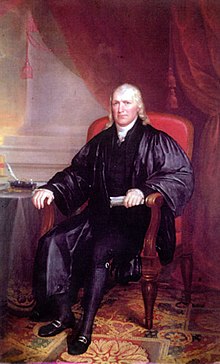Samuel Chase (politician, 1741)
Samuel Chase (born April 17, 1741 in Princess Anne , Somerset County , Province of Maryland , † June 19, 1811 in Washington, DC ) was a Supreme Court Justice of the United States and as a signatory of the United States Declaration of Independence for Maryland one of the American founding fathers .
Life
Youth and early life
Samuel Chase was a cousin of Jeremiah Chase (1748-1828) a member of the Continental Congress . His father was the Reverend Thomas Chase, an Episcopal Church in the USA priest who immigrated to Somerset County, Maryland. In 1743 the family moved to Baltimore , where the father took a new job. Samuel Chase received home schooling until he was 18 when he went to Annapolis to study law. He was admitted to the bar in 1761 and began a legal practice in Annapolis. In 1764 he was elected to the Maryland General Assembly and was an MP until 1784.
In the judge's office
In 1774 he represented Maryland in the First Continental Congress , was re-elected in 1775, and served there until 1778. In 1786 he moved to Baltimore, which remained his hometown for the rest of his life. That same year he was appointed Chief Justice of the Baltimore District Criminal Court and then Chief Justice of the Maryland General Court. In 1796 he was appointed judge of the United States Supreme Court, which he remained until his death.
The prosecution
Chase was faced with six charges by the House of Representatives in late 1804 , in particular Chase's approach to the John Fries case . Two more charges were later added. The Jefferson Republican- controlled Senate initiated impeachment proceedings against Judge Chase in early 1805 . He was accused of political bias, but he was acquitted of all charges by the Senate on March 1, 1805. To date, he has remained the only Supreme Court judge against whom impeachment proceedings have been initiated. His acquittal is seen as a confirmation of the view that an independent federal judiciary can survive political party problems.
Web links
- Samuel Chase in the Biographical Directory of the United States Congress (English)
- Samuel Chase in the database of Find a Grave (English)
| personal data | |
|---|---|
| SURNAME | Chase, Samuel |
| BRIEF DESCRIPTION | Judge and Signatory of the United States Declaration of Independence |
| DATE OF BIRTH | April 17, 1741 |
| PLACE OF BIRTH | Princess Anne , Somerset County , Province of Maryland |
| DATE OF DEATH | June 19, 1811 |
| Place of death | Washington, DC , United States |

